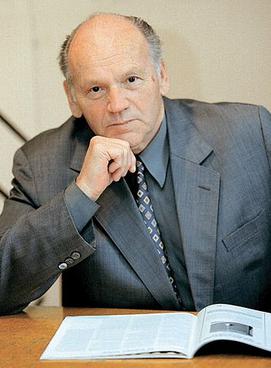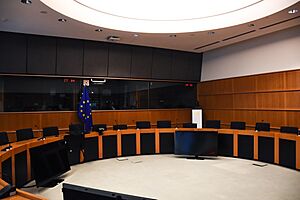Jože Pučnik facts for kids
Quick facts for kids
Jože Pučnik
|
|
|---|---|

Pučnik in the late 1990s
|
|
| Leader of the Social Democratic Party | |
| In office 1989 – May 1993 |
|
| Preceded by | France Tomšič |
| Succeeded by | Janez Janša |
| Personal details | |
| Born | 9 March 1932 Črešnjevec, Yugoslavia |
| Died | 11 January 2003 (aged 70) Germany |
| Political party | Social Democratic Party |
| Other political affiliations |
DEMOS |
Jože Pučnik (born March 9, 1932 – died January 11, 2003) was an important Slovenian thinker and politician. He was known for speaking out against the strict communist government in Yugoslavia. He believed people should have more freedom.
Pučnik was put in jail for seven years because of his views. Later, he had to leave the country. When he came back to Slovenia in the late 1980s, he became a leader. He led a group of democratic parties called the Democratic Opposition of Slovenia. This group won the first free elections in 1990. They helped bring democracy and a new economy to Slovenia. Many people see Pučnik as one of the main people who helped Slovenia become independent from Yugoslavia.
Contents
Early Life and Education
Pučnik was born in a small village called Črešnjevec. This was in a part of Yugoslavia that is now Slovenian Styria. His family were farmers and Catholic. During World War II, his family supported the fight against the Nazis. His older brother was even a resistance fighter.
Even as a teenager, Pučnik didn't agree with the communist government. He wrote some critical ideas in his high school paper. Because of this, he wasn't allowed to take his final exams. Since he couldn't go to university, he joined the Yugoslav People's Army. After his military service, he finally took his exams and went to the University of Ljubljana. He studied philosophy and comparative literature and finished his degree in 1958.
While living in Ljubljana, he joined a group of young thinkers. They were called the Critical generation. This group wanted to create more open discussions. They challenged the strict rules of the government in Slovenia. Pučnik believed he could change the system from the inside. So, he joined the Communist Party of Slovenia. At the same time, he wrote articles for a journal called Revija 57. In these articles, he openly criticized the government's economic plans.
Speaking Out Against the Government
In 1958, Pučnik was arrested. He was accused of trying to "overthrow the socialist system." He was sentenced to nine years in jail. His trial was very short, lasting only a few hours. He was accused of encouraging workers to go on strike. Some people think his arrest was a way for the government to silence thinkers who disagreed with them.
He was released from prison in 1963. Right away, he started writing again for another journal called Perspektive. By this time, he was openly showing his disapproval of the government. In 1964, he wrote an article called The Problems of Our Agriculture. In it, he used official facts to show that the government's farming policies were not working well. He was arrested again and sentenced to two more years in prison. He was also kicked out of the Communist Party.
While he was in prison, Pučnik became a hero to many young people. A famous writer, Dominik Smole, even dedicated a play to him. Another writer, Primož Kozak, based a character on him in his play. Both plays used stories to show how the government was unfair.
Life Abroad and University Work
Pučnik was released from jail in 1966. He tried to find a job but couldn't. So, he decided to move to West Germany. He lived in Hamburg and worked manual jobs to make money. When he wanted to study more at the University of Hamburg, the University of Ljubljana wouldn't send his degree papers. So, he started his university studies again. He studied philosophy and sociology and earned his PhD in 1971.
He then worked as a sociology teacher at universities in Hamburg and Lüneburg. While in Germany, Pučnik supported the German Social Democratic Party. He became good friends with some of their leaders. In the late 1980s, he admired Gerhard Schröder, who later became Germany's leader. Pučnik saw Schröder as a role model for his own political work.
During his time away, he stayed in touch with other important thinkers in Slovenia.
Coming Back to Slovenia
In the 1980s, Pučnik was finally able to publish articles in Slovenia again. He wrote for an alternative journal called Nova revija. In 1987, he helped write an important document. It was called the Contributions to the Slovenian National Program. This document was a response to a Serbian document and helped set the stage for political opposition to the communist government. It was also the first time a legal publication openly called for Slovenia to be independent from Yugoslavia. Pučnik's article in it focused on the need for democracy and political choices. He strongly said that Slovenia needed to be fully independent to grow in this way.
He returned to Slovenia in 1989. He was invited by a new opposition group, the Social Democratic Union of Slovenia. He became the leader of this party in 1989. The next year, he was chosen to lead the Democratic Opposition of Slovenia. This was a group of all the democratic parties that opposed the government. This group won the first democratic elections in 1990.
Pučnik ran for President of Slovenia but lost to Milan Kučan. Kučan was the last leader of the Communist Party in Slovenia. However, Pučnik was elected to the Slovenian Parliament. He remained the official leader of the Democratic Opposition of Slovenia and their main person in parliament.
From 1990 to 1992, he was one of the key figures who led Slovenia to become independent from Yugoslavia. In 1992, Pučnik decided to join his party with the Liberal Democratic Party. He briefly served as vice-president in the first government led by Janez Drnovšek.
In the 1992 elections, Pučnik's party, the Social Democratic Party of Slovenia, did not do well. They barely got enough votes to enter Parliament. Pučnik then stepped down as party president. Janez Janša took over as leader. From 1992 to 1996, Pučnik was a member of the National Assembly of Slovenia. During this time, he led a group that looked into historical injustices from the communist era after World War II.
After 1996, he stopped being active in politics. But he remained an honorary president of his party. He continued to share his opinions on important public matters. He was very critical of the policies of Prime Minister Janez Drnovšek and President Milan Kučan. He also criticized the shift to democracy in general. He felt there were still problems with fairness and old ways of doing things from the past government.
He passed away in Germany in 2003. He was buried in his home village of Črešnjevec. Many people attended his funeral. His lifelong friend, Ivo Urbančič, gave a speech.
His Important Legacy
Pučnik is seen as one of the founders of independent Slovenia. Some people, especially in Slovenia, even call him the "Father of Slovenian Democracy."
In 2006, he was given the Order of Distinct Merits of Slovenia after his death. In 2007, the Slovenian government named the main international airport in Slovenia after him. It is now called the Ljubljana Jože Pučnik Airport. Some people, including the then-President Janez Drnovšek, didn't agree with renaming the airport. They respected Pučnik but felt he wouldn't have wanted such a big public honor. A writer and former colleague, Spomenka Hribar, said that Pučnik was a humble person who didn't like public praise. His son, Gorazd, also said something similar but didn't oppose the renaming.
A research group called the Jože Pučnik Institute and the elementary school in his home village are also named after him.
In 2018, the European Parliament announced that a meeting room would be named after Jože Pučnik. The official opening happened in Brussels. Important leaders like the President of the European Parliament and the President of Slovenia were there. Pučnik's family also attended the event.
Personal Life
Jože Pučnik had a brother named Ivan Pučnik. Ivan was a farmer and politician. He was first a member of the Communist Party but later also became a critic of the government. He helped start the Slovenian Peasant Union in 1989.
Jože Pučnik was married twice. After he was first released from jail in 1963, he met Irena Žerjal. She was a young Slovenian writer from Trieste, Italy. They got married the same year, but Pučnik was already back in prison. He wasn't allowed to be at his own wedding, so his brother Ivan stood in for him. His first son was born in 1964. When Pučnik was released in 1966, the family moved to Germany. However, in 1969, his wife decided to return to Trieste with their son. Pučnik chose to stay in Germany.
He later married Christel Kunath. They had a daughter named Katharina. He also adopted his second wife's son, Marcus.
His son from his first marriage, Gorazd Pučnik, is the director of a boarding school in Trieste, Italy. His stepson Marcus Pucnik is a journalist who lives in Barcelona, Spain.
Major Works
- Kultura, družba in tehnologija (Culture, Society and Technology, 1988)
- K političnemu sistemu Republike Slovenije (Towards a Political System of the Republic of Slovenia, 1990)
- Iz arhivov slovenske politične policije (From the Archives of the Slovenian Political Police, 1996)
- Izbrano delo (Selected Works, edited by Ivan Urbančič, Janez Janša et al., 2003)
See also
- France Bučar
- Contributions to the Slovenian National Program
- Breakup of Yugoslavia
- Ten Day War
- Politics of Slovenia
 | Sharif Bey |
 | Hale Woodruff |
 | Richmond Barthé |
 | Purvis Young |


